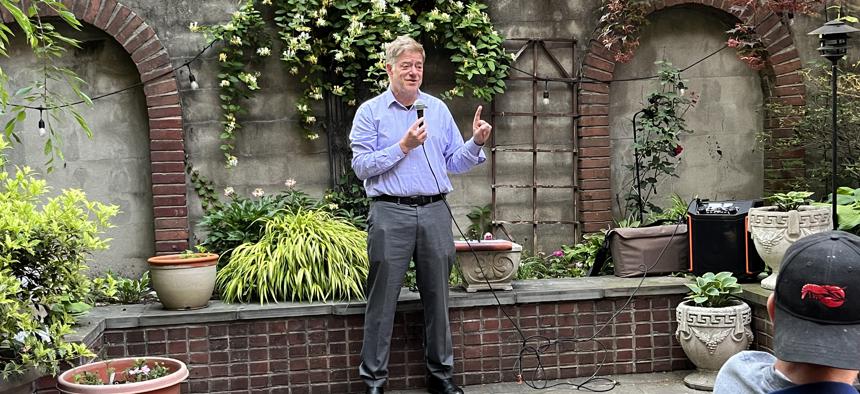Fountain House advocates for greater support for people living with serious mental illness
The nonprofit’s CEO, employees and members championed the organization’s clubhouse model and stressed its potential for bettering the mental health care system

Fountain House CEO Ken Zimmerman speaks to guests at the Community Meet and Greet hosted by the mental health nonprofit Sunny Sequeira
“Upwards of 40% of Fountain House members have previously been unsheltered before they became a member. Ninety-nine percent are housed within a year,” Fountain House CEO Ken Zimmerman said to nonprofit professionals attending the organization’s Community Meet and Greet in Manhattan Tuesday night.
The event, which drew attendees from mental health organizations like NAMI-NYC and the Bazelon Center for Mental Health Law and the think tank 5BORO Institute, supported Fountain House’s new national campaign: Healing Minds, Powering Communities. This multi-year movement aims to maximize public support, funding, and access to community focused solutions that guarantee people living with serious mental illness recover and thrive.
The Community Meet and Greet also occurred during Fountain House’s Community Mental Health Week of Action where elected officials around the country visit clubhouses to learn about their purpose. Fountain House member and emcee for the night Aquapay Ashley, who became a member just a few months ago, gave opening remarks.
“[Fountain House] has been a gem already in my life. I no longer feel so alone, and I'm getting the chance to practice socializing or interacting more appropriately, on a consistent basis, with more opportunity to self reflect and receive guidance from experts and peers here.”
Ashley mentioned membership in the Advocacy Academy and Wellness Unit, two groups that allow members to hone in on their interests and find community. She passed the microphone to CEO Ken Zimmerman who spoke on the role of clubhouses in improving the current state of the mental health care system.
“What Fountain House and clubhouses like it represent, more than anything else, is that when one starts with community, – we started as a therapeutic intervention – starts with dignity, starts by respecting the agency of everybody involved, remarkable things start to happen,” he said.
Founded in the mid 20th century, Fountain House follows the clubhouse model which provides those living with serious mental illness support for recovery in a community-based place. Over 300 clubhouses exist around the world and offer members the chance to engage in personal development and learn how to reintegrate into society.
Speaking to the organization’s larger goals, Zimmerman said, “Our ambition is that community centered work like what goes on in clubhouses should be part of the mental health infrastructure of this nation. The 14 million people in this country with serious mental illness, they've been failed for all too long. They fail because the only thing most people think of are medications and the like. Those are valuable, but without community, without investing in the fundamentals of what enables people not just to be managed but to recover, we are selling people short.”
Fountain House member Alex Rowan-Hazlerigg closed the opening remarks by reflecting on her time at Fountain House and noting that “one year of membership in clubhouse requires less funding than two weeks in hospital, and it's more fun.”
To educate guests further, Fountain House members and media strategy director Minhee Cho offered a tour of the space including its employment center. They pointed out that Fountain House membership decreases Medicaid costs by 21% due to fewer hospitalizations.
The event started and ended with time to network and learn more about Fountain House and the clubhouse model. City Council member Gale Brewer, members of the Manhattan District Attorney’s office, and professionals from other clubhouses like Venture House were in attendance.